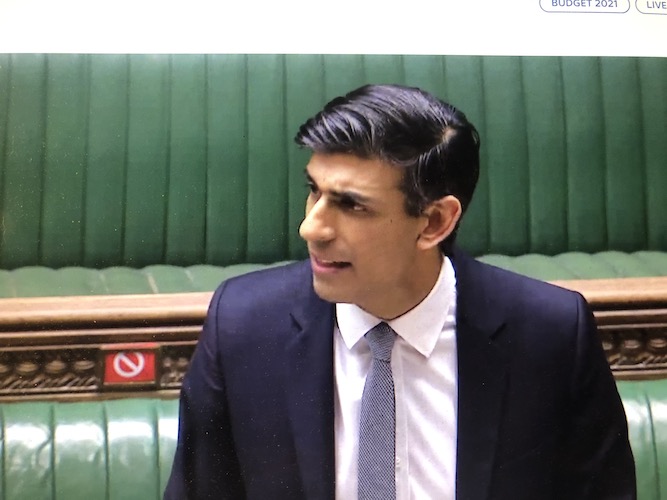Rishi Sunak has drawn qualified praise from London business groups and city analysts and scorn from Sadiq Khan for his Budget, in which he announced extensions to government support for businesses, workers and the self-employed, balanced by a future hike in corporation tax and freeze of income tax thresholds.
Jasmine Whitbread, chief executive of London First, said the Chancellor has “provided a shot in the arm to business” by extending the furlough scheme in its present form until the end of September, providing further grants to the self-employed, extending the current Business Rates holiday until the end of June and the current reduced VAT rate of 5% until the end of September. There will Business Rate discounts for nine months after June and the VAT will be held down to 12.5% until spring 2022.
London Chamber of Commerce & Industry chief executive Richard Burge welcomed the the renewed support too, saying it makes sense to keep it in place “beyond the lockdown lifting dates,” though he urged the government to keep an open mind about the need to revise the plans if emergence from the pandemic does not go as quickly as hoped. Burge stressed that London has “taken the hardest economic hit from Covid-19” and “in real terms has been ‘levelled-down’, yet its role in both domestic and global economies will be vital to driving the recovery of regions across the UK.”
Whitbread was less enthused by the rise in Corporation Tax to be levied on the largest UK firms from April 2023, taking the rate up to 25%, but said it is right to delay it for two years “to avoid choking the recovery before it’s started”. She described what Sunak called a new “super deduction” capital allowance for firms as “a big win” for those wishing to upgrade their premises and described the creation of a Thames free port in Tilbury – one of eight to be set up across the country – as “a show of confidence in the capital as one of the best places in the world to do business”.
There was a sterner reaction to the Conservative Chancellor’s Commons speech from the Labour Mayor, who said the Budget “lacks an ambitious vision for all who have suffered during the pandemic”, including NHS and other key workers” and “to everyone who has followed the rules and put their lives on hold.”
Though Khan welcomed the continuation of existing financial support measures and the Thames free port – which he hopes will assist the creation of a new creative hub along the estuary – he repeated his disappointment with funding for affordable housing the Met and new transport projects and said there was “too little from the Chancellor today to kickstart the economy, create new jobs and protect existing ones”.
Khan said he fully supporters “levelling up the rest of the country” but that this “should not mean levelling down London and its communities. Today’s budget takes London’s recovery for granted. This matters for the whole country because, whether it’s right or not, for the foreseeable future it will be London that is the powerhouse of the UK economy, helping make sure the country can pay its bills.”
Sunak (pictured), who characterised his Budget as responsible, fair, honest and green, revealed plans to create a new branch of the Treasury “campus” near Darlington as part of the government’s “levelling up” agenda. “Redrawing our economic map means revising or investment,” he said.
However, Andrew Carter, chief executive of think tank Centre for Cities, said: “The Chancellor’s vision for our economic recovery is too centralised. Governing directly from the Treasury – whether in London or Darlington – will not level up the country. Rather than moving civil servants out of Whitehall, the government should be moving powers and money out and handing them over to local leaders who understand their areas and the challenges that people face.”
Centre for London’s interim director Richard Brown said, “New grants and the gradual tapering of furlough, VAT and Business Rate support should help London’s hospitality, culture and leisure businesses through this year, as tourism remains suppressed and the trajectory of commuters’ return unclear.” He also welcomed the extension of support for the capital’s high numbers of self-employed people, many of whom have been hit hard by the pandemic, but added that “more fundamental improvements in working conditions” are needed to offer them “a better deal long term.”
Brown believes many of Britain’s larger businesses will worry about the forthcoming Corporation Tax hike but added that the new tax allowance for investment could “spark the boost in productivity that London and the UK need”. While applauding help for “the green economy” Brown regretted the Chancellor’s freeze on fuel duty, which he sees as “a signal that the government is still shrinking back from the tough measures that the net zero transition will require on our roads and in our homes.”
The Evening Standard is reporting the coming four-year tax Income Tax threshold freeze, which will follow a single rise next year, as a “hike” which will mean “thousands of low income people” being “sucked into the higher 40% bracket for the first time”, as their wages increase and cross the threshold.
Photograph from BBC live coverage.
OnLondon.co.uk provides in-depth coverage of the UK capital’s politics, development and culture. It depends greatly on donations from readers. Give £5 a month or £50 a year and you will receive the On London Extra Thursday email, which rounds up London news, views and information from a wide range of sources, plus special offers and free access to events. Click here to donate directly or contact davehillonlondon@gmail.com for bank account details.

